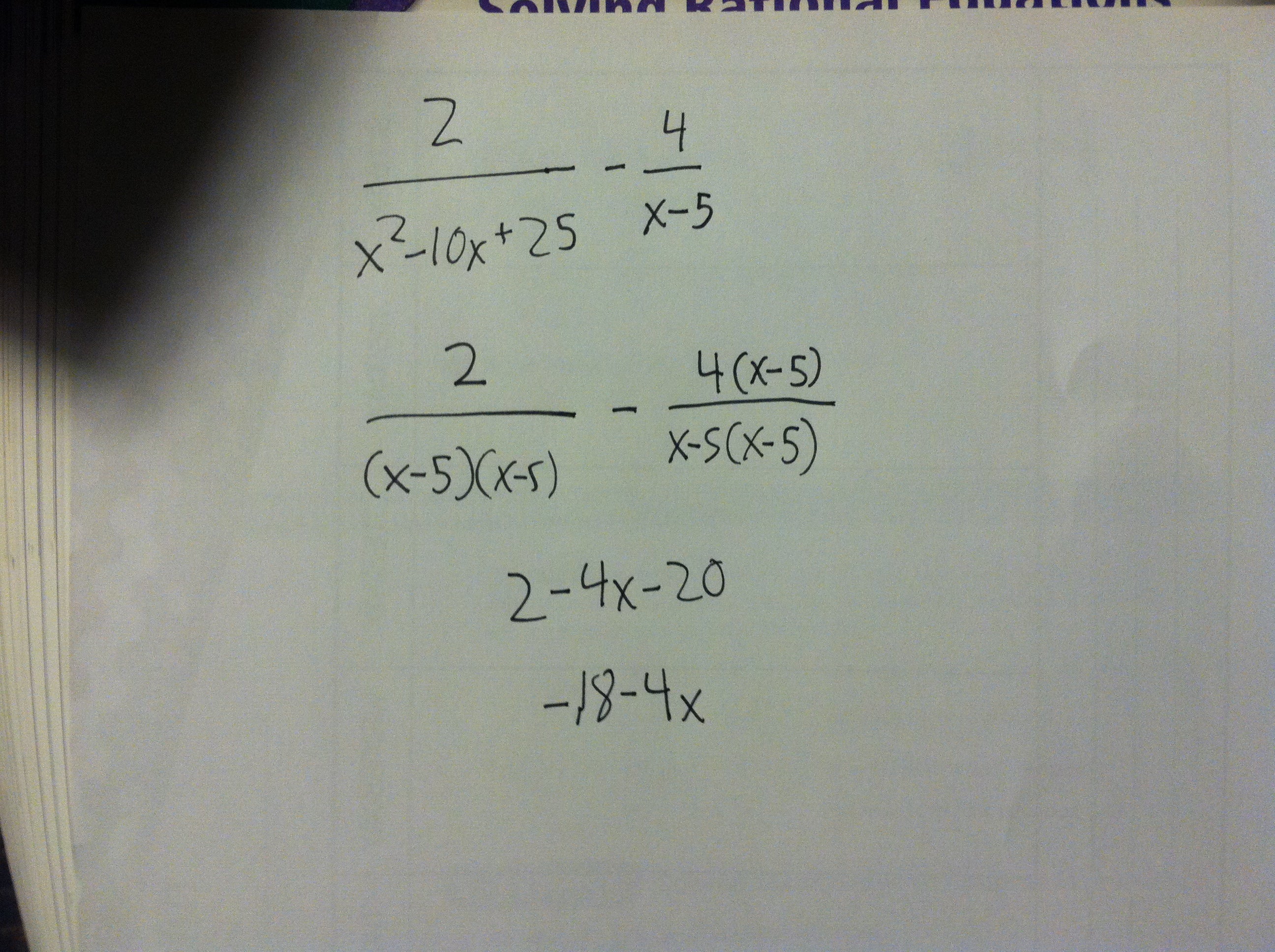 "Alex B" (alexb420)
"Alex B" (alexb420)
05/22/2014 at 12:12 • Filed to: None
 0
0
 10
10
 "Alex B" (alexb420)
"Alex B" (alexb420)
05/22/2014 at 12:12 • Filed to: None |  0 0
|  10 10 |

First you have to factor x^2-10x+25 and I got (x-5)(x-5). Next to subtract you have to get a common denominator (my teacher says that once you get a common denominator, you can basically "get rid" of the denominator.). Then you have to make everything equivalent, so I did. Then you combine like terms, and I got -18-4x.
 RamblinRover Luxury-Yacht
> Alex B
RamblinRover Luxury-Yacht
> Alex B
05/22/2014 at 12:13 |
|
Nope. Should be +20, not -20. -4x*-5 = 20, not -20.
 Rainbow
> Alex B
Rainbow
> Alex B
05/22/2014 at 12:15 |
|
I think it's 22-4x. The -20 is being subtracted, so it becomes positive 20.
 Lumpy44, Proprietor Of Fine Gif
> RamblinRover Luxury-Yacht
Lumpy44, Proprietor Of Fine Gif
> RamblinRover Luxury-Yacht
05/22/2014 at 12:15 |
|
This.
 RamblinRover Luxury-Yacht
> Alex B
RamblinRover Luxury-Yacht
> Alex B
05/22/2014 at 12:16 |
|
Also, because it's not written as equal to anything, actually dividing out (x-5)(x-5) should not be done. Should be (22-4x)/(x-5)^2.
 ttyymmnn
> Alex B
ttyymmnn
> Alex B
05/22/2014 at 12:19 |
|
Sorry, I don't math. I gave it up after college and have been happy ever since.
 Rainbow
> RamblinRover Luxury-Yacht
Rainbow
> RamblinRover Luxury-Yacht
05/22/2014 at 12:20 |
|
I think he's solving for X, but you're definitely right as far as we can see.
 Vince-The Roadside Mechanic
> Alex B
Vince-The Roadside Mechanic
> Alex B
05/22/2014 at 12:20 |
|
I suck at math and am in it right now sooooooooooooooo I am no help, but have a great day.
 KusabiSensei - Captain of the Toronto Maple Leafs
> RamblinRover Luxury-Yacht
KusabiSensei - Captain of the Toronto Maple Leafs
> RamblinRover Luxury-Yacht
05/22/2014 at 12:20 |
|
I would expand it as 2 - (4x - 20). Now it's obvious as you distribute the negative one that you end up with 22 - 4x.
If I wanted to be extremely pedantic, the expression is actually (22 - 4x) / ((x-5)^2)
 KusabiSensei - Captain of the Toronto Maple Leafs
> Alex B
KusabiSensei - Captain of the Toronto Maple Leafs
> Alex B
05/22/2014 at 12:22 |
|
Combining expression terms...joy.
Except you forgot to distribute the negative 1.
Correct answer is (22 - 4x) / ((x-5)^2)
 KusabiSensei - Captain of the Toronto Maple Leafs
> Rainbow
KusabiSensei - Captain of the Toronto Maple Leafs
> Rainbow
05/22/2014 at 12:35 |
|
You can't solve for X unless you have a value to compare it against. This is just an expression, which can be simplified, but not solved.